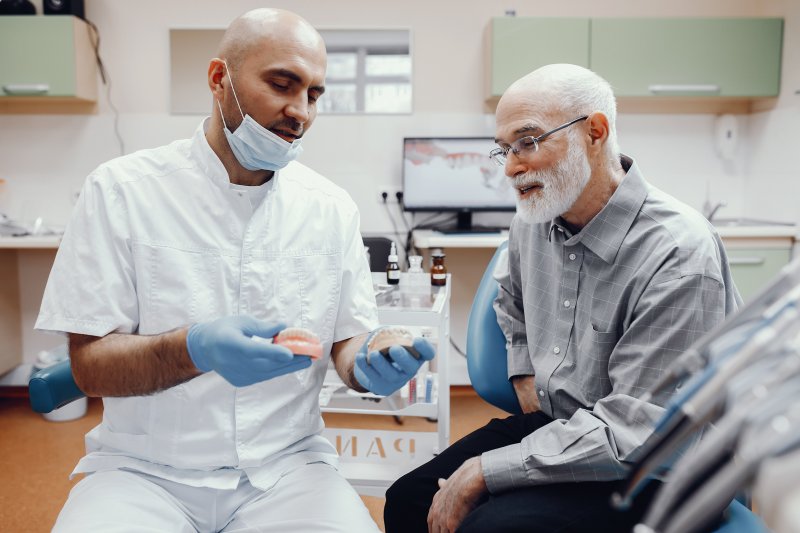
If you’ve dealt with tooth loss, you know the condition makes speaking hard. (Lacking teeth means your tongue can’t form words properly.) Still, dentures won’t fix the issue immediately – talking with them is a challenge at first. You’ll thus need to “re-learn” your speech skills as you adjust to your new teeth. Fortunately, though, your Denver dentist has some helpful advice for you. Read on to learn some useful tips and tricks for talking with dentures.
Dentures & Speech Changes
When you first start wearing them, dentures can feel awkward to wear. That’s entirely normal – their artificial teeth aren’t the same as natural ones. As a result, you may suffer short-term speech impediments while adjusting to them. These might include:
- A Lisp – Lisps can occur with dentures when you no longer use your lips and tongue in the same way.
- Slurred Speech – Since dentures can cause excessive salivation at first, you might slur your speech while wearing them.
- Hard-to-Pronounce Sounds – In many cases, denture patients initially struggle to pronounce “s,” “f,” “th,” and “v” sounds.
- Denture Clicking – A denture’s artificial teeth don’t have nerves, so you may forget how far they are from each other and bring them together harder than needed.
Tricks for Speaking with Dentures
Denture-related speech issues don’t last very long. Typically, they fade within 15-30 days of getting the new dentures. That said, you can speed up the adjustment by doing the following:
Repeat Challenging Words
Some words can be hard to pronounce when you start talking with dentures. Therefore, repeat and elongate common ones to yourself. That way, you’ll get used to effectively communicating while the dentures are in use. You’ll then be able to enunciate with the prosthetics in your mouth.
Read Aloud to Yourself
To better speak with dentures, try reading a newspaper or book aloud to yourself. This practice will help you adjust to how your voice sounds with the restorations. Also, it’ll build your confidence when you speak with others. (For this latter function, you could even try looking in the mirror as you talk.)
Talk with Family & Friends
More than anything else, talking with peers is the best way to improve your denture-related speech skills. Having a valued person hear your talk is helpful, as they can identify which words are still a struggle for you. Holding a conversation while using dentures also lets you feel like yourself.
In the end, talking with dentures is a process that takes getting used to. Ask your dentist for advice on how to manage it better going forward.
About the Practice
Riviera Family Dentistry is based in Denver, CO. Led by Drs. Luke Vernon and Zach Kingsberg, our practice emphasizes convenient and effective dentistry. We thus offer flexible hours and a wide variety of services, including preventive, cosmetic, and restorative treatments. Naturally, our list of procedures also includes high-quality dentures that restore full smiles! For more information or to book a visit, you can reach us on our website or by phone at (720)-640-0272.
